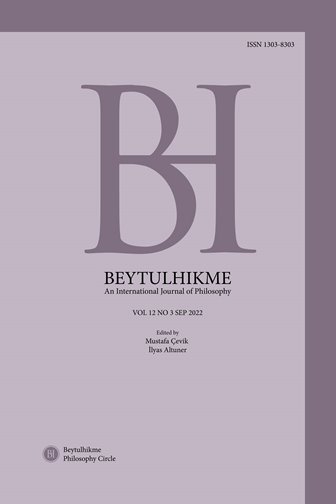Author :
Abstract
Bu çalışmada ehlisünnetin devletle ilgili görüşlerinin şekillenmesinde etkili bir aktör olan Maverdi’nin dine toplumsal örgütlenmede yüklediği görevler ele alınmaya çalışılmıştır. Bu yapılırken öncelikle Maverdi’nin ehlisünnet devlet düşüncesindeki öneminden bahsedilmiştir. Çalışmanın iki ana amacı bulunmaktadır: Maverdi’nin düşüncelerinin temelinde var olan insan anlayışının devletle ilgili fikirlerinin oluşumunda etkili olduğunu göstererek onun sahip olduğu insan anlayışının günümüzde deneysel bazı çalışmalarla desteklendiğini ve aynı insan anlayışının günümüzde de kabul gördüğünü ortaya koymak. İnsanla ilişkili olgu ve olaylara getirilen her yorum, yorumlayanın insanın mahiyetine dair fikirleri etrafında şekillenmektedir. Ehlisünnet düşüncesinin devletle ilgili görüşlerinin şekillenmesinde önemli bir aktör olan Maverdi’nin de insanı ilgilendiren din ve devletle ilgili düşüncelerinde belirleyici unsur, onun insan anlayışı olmuştur. O, insanı bencil, kötülüğe meyyal, iyiliğe yönlendirilmesi gereken bir varlık olarak görmüş, devlet ve dine bakışını da bu anlayışa göre şekillendirmiştir. Diğer amacımız ise dinin Maverdi düşüncesinde tekabül ettiği yeri tespit etmektir. Ona göre din toplumsal uzlaşıyı sağlama, metafizik caydırıcılık ve meşruiyet sağlama işlevlerini yerine getirerek devlete yardımcı olmaktadır.
Keywords
Abstract
In this paper, the meanings ascribed to religion in a social union by Abu al-?asan ?Ali Ibn Mu?ammad al-Mawardi (972-1058), an influential actor in establishing the perspectives of Ahl as-Sunnah on a State, were discussed. While doing so, first of all, the importance of al-Mawardi in the thought of the Ahl as-Sunnah state was mentioned. The study has two main purposes: To show that the understanding of human, which is the basis of al-Mawardi's thoughts, is effective in the formation of his ideas about the state, and to show that his understanding of human is supported by some experimental studies today and the same understanding of human is accepted today. Any events and construes made on human-related phenomena are centered around the construer’s beliefs about the nature of human beings. Al-Mawardi, who was a key figure in shaping the views of Ahl as-Sunnah on the State, was also a definitive factor in his pubic-related views on religion and the State. He considered human beings as self-centered, prone to evil, and an entity that should be steered towards good, and structured his view of the State and religion according to this idea. Our other purpose is to determine the place where religion corresponds to al-Mawardi thought. According to him, religion benefits the State in providing social reconciliation, metaphysical deterrent, and legitimacy.
Keywords
- Al-Baghdadi, A. M. (2003). Maverdi’nin Siyasi Düşüncesinde İnsan ve Toplum (M. Sarıbıyık, Trans.). Dicle Üniversitesi İlahiyat Fakültesi Dergisi, 5(2), 77–79.
- Al-Mawardi, A. H. (1973). Edebü’d- Dünya ve’d-Din (4th ed.). Babil Halebi.
- Al-Mawardi, A. H. (1981). Kitâbu Teshîli’n-Nazar ve Ta’cîli’z-Zafer fî Ahlâki’l-Melik ve Siyâseti’l-Mulk. Dâru’n-Nahdati’l-Arabiyye.
- Al-Mawardi, A. H. (1983). Nasîhatu’l-Mulûk. Mektebetu’l-Felâh.
- Berger, P. L. (1993). Dinin Sosyal Gerçekliği (A. Coşkun, Trans.). İnsan Yayınları.
- Gibb, H. A. R. (1991). İslam Medeniyeti Üzerine Araştırmalar (K. Durak, Trans.). Endülüs.
- Hamlin, J. K., & Wynn, K. (2012). Who Knows What’s Good to Eat? Infants Fail to Match the Food Preferences of Antisocial Others. Cognitive Development, 27(3), 227–239. https://doi.org/10.1016/j.cogdev.2012.05.005
- Hamlin, J. K., Wynn, K., & Bloom, P. (2007). Social Evaluation by Preverbal In- fants. Nature, 450(7169), 557–559. https://doi.org/10.1038/nature06288
- Hamlin, J. K., Wynn, K., Bloom, P., & Mahajan, N. (2011). How Infants and Toddlers React to Antisocial Others. Proceedings of the National Academy of Sciences of the United States of America, 108(50), 19931–19936. PubMed. https://doi.org/10.1073/pnas.1110306108
- Kuhlmeier, V., Wynn, K., & Bloom, P. (2003). Attribution of Dispositional States by 12-Month-Olds. Psychological Science, 14(5), 402–408. JSTOR. http://www.jstor.org/stable/40064159
- Lipset, S. M. (1986). Siyasal Insan (M. Tunçay, Trans.; 1st ed.). Teori Yayınları.
- Mahajan, N., & Wynn, K. (2012). Origins of “Us” Versus “Them”: Prelinguistic Infants Prefer Similar Others. Cognition, 124(2), 227–233. https://doi.org/10.1016/j.cognition.2012.05.003
- Okumuş, E. (2005). Klasik Dönem Osmanlı Devleti’nde Din-Devlet Ilişkisi. Lotus Ya- yınevi.
- Özcan, M. (2016). Insan Felsefesi: Insanin Neligi Üzerine Bir Sorusturma. Bilgesu Ya- yincilik.
- Piazza, J., Bering, J. M., & Ingram, G. (2011). “Princess Alice Is Watching You”: Children’s Belief in an Invisible Person Inhibits Cheating. Journal of Experimental Child Psychology, 109(3), 311–320. https://doi.org/10.1016/j.jecp.2011.02.003
- Sheskin, M., Bloom, P., & Wynn, K. (2014). Anti-Equality: Social Comparison in Young Children. Cognition, 130(2), 152–156. https://doi.org/10.1016/j.cognition.2013.10.008
- Weber, M. (1995). Toplumsal ve Ekonomik Örgütlenme Kuramı (Ö. Ozankaya, Trans.; 1st ed.). İmge Kitabevi.
- Wynn, K. (2007). Some Innate Foundations of Social and Moral Cognition. In The Innate Mind,Volume 3: Foundations and the Future,(Evolution and Cognition) (pp. 330–348). Oxford University Press.
- Wynn, K., & Bloom, P. (2014). The Moral Baby. In Handbook of moral development, 2nd ed (pp. 435–453). Psychology Press.
- Wynn, K., Bloom, P., Jordan, A., Marshall, J., & Sheskin, M. (2018). Not Noble Savages After All: Limits to Early Altruism. Current Directions in Psychological Science, 27(1), 3–8. https://doi.org/10.1177/0963721417734875





